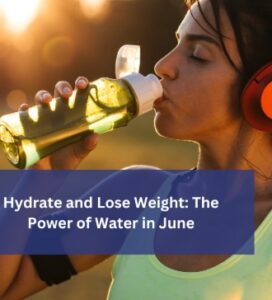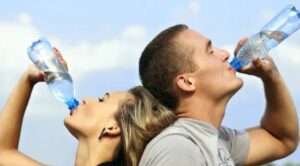The Importance of Hydration in Weight Loss
In the quest for effective weight loss, many people focus solely on diet and exercise, often overlooking a crucial factor: hydration. Proper hydration plays a significant role in weight management and overall health. This article will explore the connection between hydration and weight loss, providing you with valuable insights and practical tips to optimize your weight loss journey through proper hydration.
The Science Behind Hydration and Weight Loss
Hydration is essential for numerous bodily functions, including metabolism and fat burning. When you’re properly hydrated, your body can more efficiently break down fat stores and convert them into energy. Additionally, adequate water intake helps to flush out toxins and waste products, supporting your body’s natural detoxification processes.
Research has shown that increased water intake is associated with weight loss through two primary mechanisms: decreased feeding and increased lipolysis. A study published in the journal Frontiers in Nutrition found that drinking water before meals can help reduce calorie intake, leading to weight loss over time. Furthermore, proper hydration has been linked to increased fat breakdown (lipolysis), contributing to more effective weight management.

Strategies for Optimal Hydration
Achieving proper hydration goes beyond simply drinking eight glasses of water a day. Here are some effective strategies to ensure you’re getting enough fluids:
Start your day with water: Drink a glass of water as soon as you wake up to kickstart your metabolism and rehydrate after sleep.
Use a reusable water bottle: Carry a water bottle with you throughout the day to encourage consistent sipping.
Set reminders: Use smartphone apps or alarms to remind you to drink water regularly.
Eat water-rich foods: Incorporate fruits and vegetables with high water content into your diet, such as cucumbers, watermelon, and strawberries.
Flavor your water: Add natural flavors like lemon, mint, or cucumber to make water more appealing.
Monitor your urine color: Aim for pale yellow urine as an indicator of good hydration.
Drink water before meals: Consuming water 30 minutes before eating can help reduce calorie intake.
Replace sugary drinks: Swap out high-calorie beverages for water or unsweetened alternatives.
Hydration’s Impact on Metabolism and Appetite
Proper hydration can significantly boost your metabolism. When you’re dehydrated, your body’s ability to burn calories efficiently is compromised. Studies have shown that drinking 500ml of water can temporarily boost metabolic rate by up to 30%. This increase in metabolism can contribute to more effective weight loss over time.
Moreover, staying hydrated can help regulate appetite. Often, thirst is mistaken for hunger, leading to unnecessary snacking or overeating. By maintaining proper hydration, you can better distinguish between true hunger and thirst, potentially reducing overall calorie intake.
Hydration also plays a crucial role in preserving lean muscle mass during weight loss. When you’re well-hydrated, your body is less likely to break down muscle tissue for energy, focusing instead on burning fat stores. This preservation of muscle mass is essential for maintaining a healthy metabolism and achieving long-term weight loss success.
Practical Tips for Incorporating Hydration into Your Weight Loss Plan
Track your water intake: Use a journal or smartphone app to monitor how much water you’re drinking daily.
Create a hydration schedule: Plan specific times throughout the day to drink water, such as upon waking, before meals, and during exercise.
Experiment with infused water: Try different combinations of fruits, herbs, and vegetables to create flavorful, calorie-free beverages.
Consume hydrating foods: Include water-rich foods like cucumbers, watermelon, strawberries, celery, and spinach in your diet.
Drink water during exercise: Stay hydrated during workouts to optimize performance and support post-exercise recovery.
Use visual cues: Place water bottles or glasses in visible locations as reminders to drink.
Opt for sparkling water: If you crave carbonated beverages, choose unsweetened sparkling water instead of sugary sodas.
Practice mindful drinking: Take time to savor your water, focusing on its refreshing qualities and the benefits it provides to your body.
By implementing these strategies, you can make hydration an integral part of your weight loss journey, supporting your body’s natural fat-burning processes and overall health.
Remember, while hydration is crucial for weight loss, it’s most effective when combined with a balanced diet and regular exercise. Always consult with a healthcare professional before making significant changes to your diet or exercise routine, especially if you have any underlying health conditions.
As you embark on your weight loss journey, keep in mind that proper hydration is not just about losing weight; it’s about nourishing your body and supporting overall well-being. Stay consistent with your hydration efforts, and you’ll likely see improvements not only in your weight but also in your energy levels, skin health, and overall vitality.